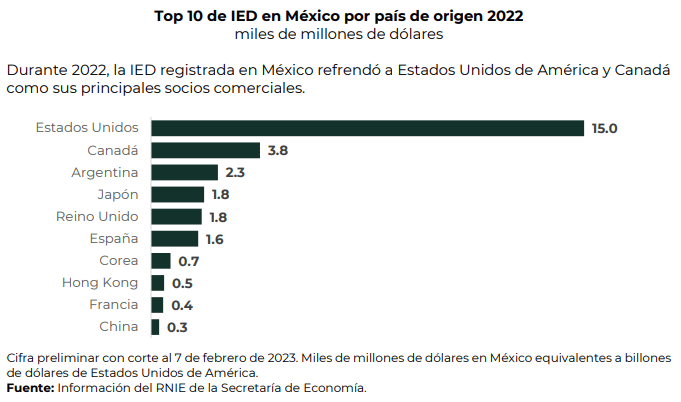The United States topped the ranking of the main countries that sent Foreign Direct Investment (FDI) to Mexico in 2022, with 15 billion dollars.
This was followed by Canada (US$3.8 billion), Argentina (US$2.3 billion), Japan (US$1.8 billion) and the United Kingdom (US$1.8 billion).
In total, Mexico registered inflows of 35.292 billion dollars in Foreign Direct Investment in 2022, which is 12% more than in 2021, considering preliminary figures as of February 7, 2023, according to data from the Ministry of Economy.

Other notable origins were: Spain (1.6 billion dollars), South Korea (700 million), Hong Kong (500 million), France (400 million) and China (300 million).
There are certain activities and companies in which FDI is normally limited to 49%, but foreigners may exceed that limit (and even go up to 100%) if they obtain authorization from the National Foreign Investment Commission (CNIE).
The CNIE takes 45 days to issue the authorization, which is subject to a study of the economic and environmental impact of the investment.
The CNIE may also impose requirements as a condition for the investment, provided that these requirements do not distort international trade.
In addition, for national security reasons, the CNIE may prevent foreign investment.
Foreign Direct Investment
Between 2017 and 2021, the CNIE approved FDI in excess of 49% in 26 companies; more than half provided private education services.
Mexico grants national treatment to foreign investment. Accordingly, foreigners may acquire fixed assets, operate in new fields of economic activity or manufacture new product lines, open and operate establishments and expand or relocate existing ones.
In addition, in principle, they may participate «in any proportion», i.e. up to 100%, in the capital stock of Mexican companies.
However, Mexico still imposes limits on FDI in certain activities or companies.
In 2017, the limit increased from 25% to 49% for air transportation: domestic, international air cab and specialized.
Also, under air services agreements negotiated by Mexico, Mexican airlines providing international service must be controlled by Mexicans (i.e., Mexicans must own 51% of the capital).
In broadcasting, the Foreign Investment Law allows FDI up to a maximum of 49%, provided that there is reciprocity with the country or territory where the investor or the economic operator that directly or indirectly controls the investor is incorporated.
![]()

